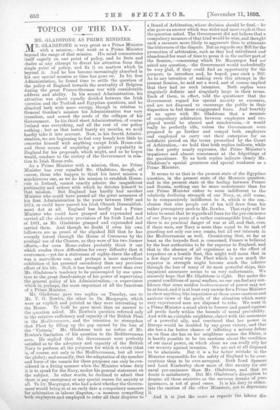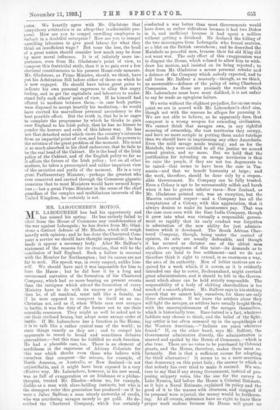TOPICS OF THE DAY.
MR. GLADSTONE AS PRIME MINISTER.
MR. GLADSTONE is very great as a Prime Minister with a mission,—but weak as a Prime Minister beyond the range of that mission. His mind concentrates itself eagerly on one point of policy, and he frets and chafes at any attempt to divert his attention from that single point of policy, and fix it on matters which lie beyond it. And. he has become increasingly absorbed in his one special mission as time has gone on. In his first Administration, be found time to settle the question of the policy of England towards the neutrality of Belgium during the great Franco-German war with considerable address and ability. In his second Administration, his attention was about equally divided between the Irish question and the Turkish and Egyptian questions, and he attacked both with some energy, though in relation to General Gordon's mission his Administration was very irresolute, and sowed the seeds of the collapse of his Government. In his third short Administration, of course Ireland was everything, and all the rest of our policy nothing ; but as that lasted barely six months, we need hardly take it into account. Now, in his fourth Admini- stration, we are beginning to feel very keenly how little he concerns himself with anything except Irish Home-rule and those means of acquiring a greater popularity in England for his proposals, which might, and as he hopes would, conduce to the victory of the Government in rela- tion to Irish Home-rule.
As a Prime Minister with a mission, then, no Prime Minister has ever equalled Mr. Gladstone, though, of course, those who happen to think his latest mission a mischievous one, as we do his mission to establish Home- rule in Ireland, cannot exactly admire the magnificent pertinacity and ardour with which he devotes himself to that mission. But England has hardly had another Minister who could have passed all the great measures of his first Administration in the years between 1869 and 18 or could have passed his Irish Church Disestablish- went Act at all. England has hardly had a, Prime Minister who could have grasped and expounded and carried all the elaborate provisions of his Irish Land Act of 1881, as Mr. Gladstone grasped and expounded and carried them. And though we doubt if even his own followers are as proud of the slipshod Bill that he has recently forced through the House of Commons by the prodigal use of the Closure, as they were of his two former efforts,—for even Home-rulers probably think it one which evades three difficulties for every difficulty that it overcomes,—yet for a statesman of eighty-three the effort was a marvellous one, and perhaps a more marvellous exhibition of his personal ascendency than any previous effort of his life. Still, it has brought out more than ever Mr. Gladstone's tendency to be preoccupied by one ques- tion to the great disadvantage of-his power of supervising • • the general policy of his Administration,—a supervision which is, perhaps, the most important of all the functions of a Prime Minister.
Mr. Gladstone gave two replies on Tuesday, one to Mr. T. G. Bowles, the other to Dr. Macgregor, which were as eltplicit and pointed as they were interesting to the House. To both he gave more than an answer to the question asked. Mr. ]3owles's question referred only to the relative sufficiency and capacity of the British Fleet in the Mediterranean, and the intention to strengthen that Fleet by filling up the gap caused by the loss of the ' Victoria.' Mr. Gladstone took no notice of Mr. Bowles's limitation of his question to the Mediterranean area. He replied that the Government were perfectly satisfied as to the adequacy and capacity of the British Navy to perform all the purposes for which it exists (that is, of course, not only in the Mediterranean, but all over the globe) ; and secondly, that the adaptation of the number and force of the vessels for these purposes can only be con- sidered in a fitting manner when the Minister whose duty it is to speak for the Navy, makes his general statement on the subject. In other words, he declined to admit that there is any emergency or any special reason for anxiety at all. To Dr. Macgregor, who had asked whether the Govern- ment would bring in at an early date a compulsory measure for arbitration in labour disputes,—a measure compelling both employers and employed to refer all their disputes to a Board of Arbitration, whose decision should be final,—he also gave an answer which was wider and more explicit than the question asked. The Government did not believe that a compulsory measure of that kind would be wise, and thought such a measure more likely to aggravate than to attenuate the bitterness of the dispute. But as regards any Bill for the promotion of arbitration, such as they had introduced and abandoned for want of time to press it in the earlier part of the Session,—concerning which Dr. Macgregor had not' asked any question,—the Government would undoubtedly be very glad, if they could find an opportunity for the purpose, to introduce and, he hoped, pass such a Bill. As to any intention of making even this attempt in the present Session, he said not a word, and of course implied that they had no such intention. Both replies were singularly definite and singularly large in their terms. Each of them, in effect, told the questioner that the Government regard his special anxiety as excessive, and are not disposed to encourage the public in their disposition to feel these exaggerated fears. And heartily as we agree with Mr. Gladstone that a measure of compulsory arbitration between employers and ein- ployed would be absurd and mischievous,—it would really be perfectly idle, unless the Government were prepared to go farther and compel both employers and employed to carry out their enterprise for an indefinite period on the terms prescribed by the Court of Arbitration,—we hold that both replies indicate, while the first pretty nearly expresses, the Prime Minister's impatience and almost resentment at the fidgettings of the questioner. To us both replies indicate clearly Mr. Gladstone's special greatness and special weakness as a. Prime Minister.
It seems to us that in the present state of the Egyptian question, in the present state of the MorOcco question,. and in the present state of the feeling between France and Russia, nothing can be more unfortunate than for- our Prime Minister either to seem indifferent to the relatively declining strength of our Navy, or, still worse,. to be comparatively indifferent to it, which is the con- clusion that nine people out of ten will draw from his rather peremptory snub to Mr. Bowles. That reply will be taken to mean that he regards all fears for the pre-eminence. of our Navy as panic of a rather contemptible kind,—that there is no practical danger of war at all, and that, even. if there were, our Navy is more than equal to its task of guarding not only our own coasts, but all our interests in the Mediterranean as well. Considering that, so far at least as the torpedo fleet is concerned, France is believed by the best authorities to be far superior to England, and that in the absence of all experience as to the effect of torpedoes on a hostile fleet, this might well mean that is a few days' naval war the Fleet which is now much the superior in strength might become much the inferior through the loss of many of its most powerful ships, this impatient assurance seems to us very unfortunate. We sincerely hope that Mr. Gladstone is right. But under the present conditions of naval warfare, no one can feel any con- fidence that sonic sudden bouleversement of power may not be at hand, and it is at least very unwise for a Prime Minister to show anything like impatience at those more cautious and anxious views of the perils of the situation which many very experienced men are disposed to take. We want in a Prime Minister a mind alert to foresee and guard against all perils fairly within the bounds of moral probability. And with an excitable neighbour, elated with the assurance of a powerful ally, and convinced that her power in Europe would be doubled by any great victory, and that she has a far better chance of inflicting a serious defeat on us than she has on her neighbour across the Rhine, it is hardly possible to be too cautious about the condition of our naval power, on which alone we can really rely for . our security against invasion. We are not at all disposed to be alarmists. But it is a far better mistake in the Minister responsible for the safety of England to be over, cautious than to be over-arrogant. Both Lord Spencer and Lord Kimberley show more of this anxiety for our naval pro-eminence than Mr. Gladstone, and that no doubt is satisfactory. But Mr. Gladstone's disposition to despise all these anxieties as the nervous dreams of pure ignorance, is not of good omen. It is his duty to atm. u- late the caution of the other Ministers, not to depreciate it.
And it is just the -same as regards the labour dis- putes. We heartily agree with Mr. Gladstone that compulsory arbitration is an altogether inadmissible pro- posal. How are you to compel unwilling employers to embark in a doubtful enterprise ? How are you to compel unwilling labourers to give good labour for what they think an insufficient wage ? But none the less, the head of a great nation should consider how much may be done by mere moral influence. It is of infinitely more im- portance, even from Mr. Gla,dstone's point of view, to compose this fratricidal strife, than it is to gain over a few electoral constituencies to his present Home-rule measure. Mr. Gladstone, as Prime Minister, should, we think, have put his Arbitration Bill before either of those on which he is now engaged. He should have taken great pains to indicate his own personal eagerness to allay this angry feeling, and to get the capitalists and labourers to under- stand fully each others' point of view. If he himself had offered to mediate between them,—in case both parties were disposed to accept heartily his mediation,—he would have exerted his marvellous personal ascendency to the best possible effect. But the truth is, that he is so eager to complete the programme by which he thinks to gain over England to his Irish policy, that he has no leisure to ponder the horrors and evils of this labour war. He has not that detached mind, which views the country's interests from an impartial point of view, and bends all its powers to the solution of the great problem of the moment. His mind is so much absorbed in his chief endeavour, that he fails to be the real head of the Cabinet. He is the head of the Irish policy of the Cabinet, and of the English policy'so far as it affects the future of the Irish policy ; but on all other matters, he takes a preoccupied and rather impatient view of the anxieties and perils of the moment. He is a very great Parliamentary Minister,—perhaps the greatest who ever conceived and carried through the Commons gigantic measures that to most Ministers would have seemed hope- less ;—but a great Prime Minister in the sense of the chief guardian of the complex and multifarious interests of the United. Kingdom, he certainly is not.







































 Previous page
Previous page